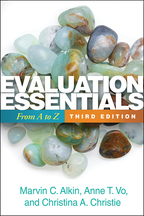Evaluation Essentials
Third Edition
From A to Z
Marvin C. Alkin, Anne T. Vo, and Christina A. Christie
HardcoverPaperbacke-bookprint + e-book
Hardcover
orderNovember 19, 2024
ISBN 9781462555444
Price: $83.00 344 Pages
Size: 6" x 9"
Paperback
orderOctober 14, 2024
ISBN 9781462555437
Price: $55.00344 Pages
Size: 6" x 9"
e-book
orderSeptember 30, 2024
PDF and Accessible ePub ?
Price: $55.00 344 Pages
ePub is Global Certified Accessible
print + e-book $110.00 $66.00
orderPaperback + e-Book (PDF and Accessible ePub) ?
Price: 344 Pages
ePub is Global Certified Accessible
Beloved for its conversational style and reliable advice, this text is now in a revised and updated third edition, reflecting key developments in evaluation. It includes expanded coverage of equity and social justice issues, values and cost analysis, visualizing qualitative data with software, and more. Twenty-six concise chapters, or “sessions,” give students, applied researchers, and program administrators a solid foundation for conducting or using evaluations. Covering both quantitative and qualitative methods, the book emphasizes fostering evaluation use. It shows how to build collaborative relationships with users; formulate answerable evaluation questions; deal with contingencies that might alter the traditional sequence of an evaluation; and collect, analyze, and report data. Student-friendly features throughout the sessions include titles written as questions, bulleted recaps, “Thinking Ahead” and “Next Steps” pointers, cautionary notes, and annotated suggestions for further reading. An in-depth case study provides the basis for end-of-session practice exercises.
New to This Edition
New to This Edition
- New sessions on context-sensitive evaluation, including the organizational, sociopolitical, and community contexts of a program.
- New or expanded discussions of timely topics: identifying evaluation decision makers, analyzing program costs, coding and visualizing qualitative data with software, and more.
- Updated suggestions for further reading and discussion in every chapter.



